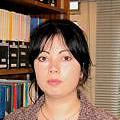 義大利研究學者路寇拉多(Luisa Corrado)是12日列席於歐洲科學獎頒獎典禮上獲獎的學者,她對於財富是否能帶來快樂的研究,使她成為獲得表揚歐盟交換計畫的瑪麗居禮傑出成就獎的五位傑出學者之一。
義大利研究學者路寇拉多(Luisa Corrado)是12日列席於歐洲科學獎頒獎典禮上獲獎的學者,她對於財富是否能帶來快樂的研究,使她成為獲得表揚歐盟交換計畫的瑪麗居禮傑出成就獎的五位傑出學者之一。
寇拉多就職於劍橋大學經濟學院,研究歐洲人的生活幸福感,她的研究報告印證了諺語所說的:「金錢無法買到幸福。」在民眾信任政府和其他官方機構的國家,所得越高,越可以讓人覺得快樂;但是如果在對政府不信任的國家之中,即使是最富有的人,也不會比較快樂。根據寇拉多的研究,丹麥人是歐洲人中最快樂的,英國則位居第九名,寇拉多表示:「從研究中清楚看到,政府不應該只重視財富成長,因為在相互支持和信任的社會裡,人們會越容易覺得生活幸福。」
除了寇拉多之外,其他瑪麗居禮傑出成就獎的獲獎人之研究領域包括基因在造成罹患癌症因素的的多重影響、特薄的碳膜片在消費性電子的應用、黑暗能量和小分子在免疫反應的作用。
 獲獎者是由三個評審團所選出,專業領域各有一個評審團代表,並由歐洲和國際科學界的知名人士所組成,所有獲獎者總共可以獲得獎金200萬歐元(約美金620萬)。
獲獎者是由三個評審團所選出,專業領域各有一個評審團代表,並由歐洲和國際科學界的知名人士所組成,所有獲獎者總共可以獲得獎金200萬歐元(約美金620萬)。
另外被表揚的計畫還包括研究過去80萬年地球氣候變化的EPICA計畫。EPICA,又可稱為歐洲的南極冰核探索計畫,由10個歐洲國家的12個不同機關所組成,現已成功地獲取過去曾經發生劇變的氣候資料,可以作為相對評估於現在氣候變遷情況的參考。資料顯示現在溫室氣體的劇升已達到歷史新高,造成全球氣候以前所未有的速度進行劇變。
除此之外,由EPICA所取得的冰核資料也讓科學家得以詳細研究北半球和南半球的連結情形。
「這個獎項剛好在很重要的時機頒發,就是國際極地年(International Polar Year,IPY)」歐洲科學基金會的歐洲極地委員會主席安格頓(Paul Egerton)表示,「國際極地年的主要訴求就是將科學帶入大眾的生活,這個獎項也能讓輿論更加重視氣候變遷議題。」
Italian researcher Luisa Corrado was among the those honored today at the European Science Awards Ceremony, for her work on whether wealth can bring happiness. Corrado received one of five Marie Curie Excellence Awards, which recognize excellent researchers who have participated in the EU's researcher exchange program.
Working at the University of Cambridge Faculty of Economics, Corrado led research that maps European feelings of well-being. Her report confirms the old adage that money can't buy happiness. In countries where the population said that they trusted the government and other institutions, a high income made people happier still, but in those countries where such trust was lacking, even the richest tended to be less happy.
The Danish emerged as the happiest people in Europe, while the British rank ninth. Dr. Corrado said, "One thing that is clear from the report is that it is not enough for governments to focus on improving wealth. Our well-being would be more likely to flourish in a mutually supportive and trusting society."
Alongside Corrado, other recipients of the Marie Curie Excellence award covered issues as diverse as the roles of genes in cancers, ultra-thin carbon films for use in consumer electronics, dark energy and the role of small molecules in the body's immune response.
The winners were selected by three separate Grand Juries, one for each category, composed of leading figures from European and international science. They share an award fund of almost �2 million (US$6.2 million).
Other projects honored at the event included the EPICA project, which has extended understanding of the Earth's climate over the last 800,000 years.
The European Project for Ice Coring in Antarctica, EPICA. The EPICA project - carried out by 12 partners from 10 European nations - was successful in retrieving past climate records of great impact for the assessment of our current climate change.
The results have shown that the recent rise in greenhouse gas concentration is beyond any historical comparison, leading to climate change at an unprecedented rate.
In addition, the ice cores obtained by the EPICA team have allowed scientists to study in detail the coupling of the northern and southern hemisphere.
"The prize has come at a very important time as we are currently in the International Polar Year, IPY," said Paul Egerton, head of the European Polar Board at the European Science Foundation. "The main aspect of the IPY is to bring science to the public and this prize will help to give more visibility to climate change."
全文及圖片詳見:ENS





